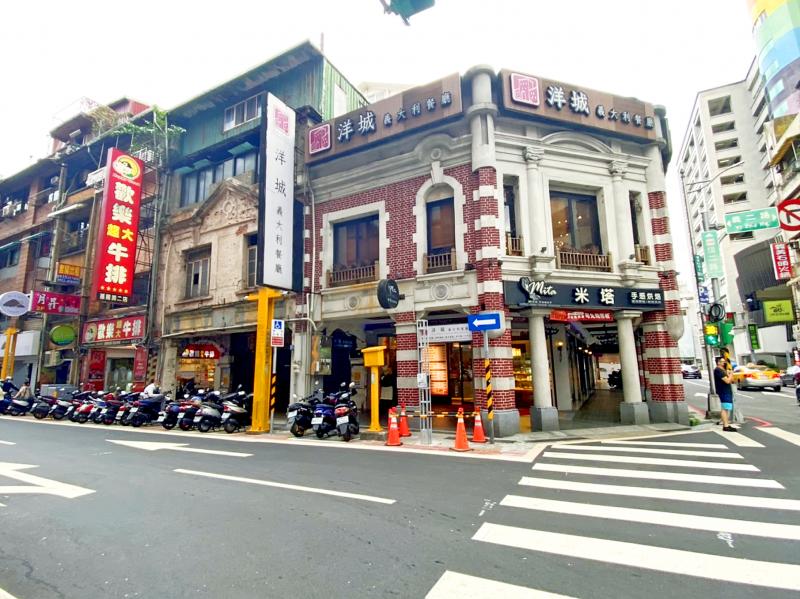That a great-grandfather of Japan’s next prime minister operated stores in Keelung in the late 19th century has sparked hope that the historical link could bring the two nations closer together.
The election of former Japanese minister of foreign affairs Fumio Kishida as the Liberal Democratic Party’s leader on Wednesday has sparked excitement in Taiwan, as he has repeatedly expressed support for Taiwan.
However, Kishida’s connection with the nation runs deeper than words, with traces of his family’s business still standing on a street corner in central Keelung.

Photo: Yu Chao-fu, Taipei Times
At the intersection of what is now Sin 2nd Road (信二路) and Yi 2nd Road (義二路) stands a shopfront that once housed a cafe and kimono store owned by Kishida’s great-grandfather Ikutaro Kishida, Keelung Mayor Lin Yu-chang (林右昌) said on Thursday.
Ikutaro Kishida was born in Hiroshima Prefecture’s Higashihiroshima, Keelung Cultural Affairs Bureau Director Chen Ching-ping (陳靜萍) said.
In 1895, at the age of 28, he moved to Keelung, where he and his brother, Taichiro Kishida, opened the businesses that bore their family name, Chen said.
Four years later he returned to his home prefecture to live in Kure, which became a sister city of Keelung in 2017, she said.
During the Japanese colonial era, the Port of Keelung was Taiwan’s gateway to the world, Lin said.
As it was close to the port, many Japanese people lived and shopped on Yi 2nd Road, earning it the nickname “Keelung’s Ginza,” he said.
The Victorian-style buildings that once housed the Kishida family businesses have been well preserved, Lin said.
Today, visitors can eat at a pasta restaurant or peruse an independent bookstore in the historic buildings, he added.
The two structures are still very stable, Lin said, adding that the owners have been granted a restoration subsidy from the Ministry of Culture, with plans still being drafted.
Through this historical connection, Lin said he hopes feelings of mutual affinity between Taiwan and Japan will deepen.
Additional reporting by CNA

Alain Robert, known as the "French Spider-Man," praised Alex Honnold as exceptionally well-prepared after the US climber completed a free solo ascent of Taipei 101 yesterday. Robert said Honnold's ascent of the 508m-tall skyscraper in just more than one-and-a-half hours without using safety ropes or equipment was a remarkable achievement. "This is my life," he said in an interview conducted in French, adding that he liked the feeling of being "on the edge of danger." The 63-year-old Frenchman climbed Taipei 101 using ropes in December 2004, taking about four hours to reach the top. On a one-to-10 scale of difficulty, Robert said Taipei 101

Nipah virus infection is to be officially listed as a category 5 notifiable infectious disease in Taiwan in March, while clinical treatment guidelines are being formulated, the Centers for Disease Control (CDC) said yesterday. With Nipah infections being reported in other countries and considering its relatively high fatality rate, the centers on Jan. 16 announced that it would be listed as a notifiable infectious disease to bolster the nation’s systematic early warning system and increase public awareness, the CDC said. Bangladesh reported four fatal cases last year in separate districts, with three linked to raw date palm sap consumption, CDC Epidemic Intelligence

Two Taiwanese prosecutors were questioned by Chinese security personnel at their hotel during a trip to China’s Henan Province this month, the Mainland Affairs Council (MAC) said yesterday. The officers had personal information on the prosecutors, including “when they were assigned to their posts, their work locations and job titles,” MAC Deputy Minister and spokesman Liang Wen-chieh (梁文傑) said. On top of asking about their agencies and positions, the officers also questioned the prosecutors about the Cross-Strait Joint Crime-Fighting and Judicial Mutual Assistance Agreement, a pact that serves as the framework for Taiwan-China cooperation on combating crime and providing judicial assistance, Liang

US climber Alex Honnold left Taiwan this morning a day after completing a free-solo ascent of Taipei 101, a feat that drew cheers from onlookers and gained widespread international attention. Honnold yesterday scaled the 101-story skyscraper without a rope or safety harness. The climb — the highest urban free-solo ascent ever attempted — took just more than 90 minutes and was streamed live on Netflix. It was covered by major international news outlets including CNN, the New York Times, the Guardian and the Wall Street Journal. As Honnold prepared to leave Taiwan today, he attracted a crowd when he and his wife, Sanni,